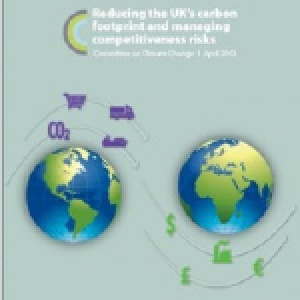
This report looks at the role of consumption based emissions (i.e. taking into account emissions embedded in imported goods) in contributing to the UK’s overall carbon footprint. It covers past trends and sets out future scenarios for UK consumption emissions. It also looks at the lifecycle emissions of low-carbon technologies in order to understand how their deployment would impact the UK’s carbon footprint.
It also looks at whether offshoring of industry in response to low-carbon policies has been or could be a significant contributory factor to reductions in production emissions. This would not have any benefits for the UK’s carbon footprint and therefore global emission reductions, and would not be desirable from a wider economic perspective.
Key findings is that the UK’s carbon footprint has increased over the past two decades, as growth in imported emissions has more than offset reductions in production emissions. However, offshoring of industry in response to low-carbon policies has had at most a minor impact in reducing production emissions, and the carbon footprint would have increased more had production emissions not been reduced.
In more detail:
- The UK’s carbon footprint has increased by around 10% since 1993, as growth in imported emissions more than offset the 19% reduction in production emissions. As a result, the UK is now one of the world’s largest net importers of emissions, with a carbon footprint that is around 80% larger than its production emissions, reflecting the relatively small share of manufacturing in UK GDP.
- The increase in imported emissions was largely a result of rising incomes which increased demand for manufactured goods; these are, due to globalisation, now mostly produced elsewhere.
- The fall in production emissions was not due to significant offshoring in response to low-carbon policies. Rather, production emissions fell due to reductions in emissions from power generation and non-CO2 gases (e.g. methane from waste). There has also been a reduction in industry emissions which reflects a falling carbon intensity of production due to energy efficiency improvement and fuel switching, industrial restructuring related to broader processes of globalisation, and more recently the impact of recession. If production emissions had not been reduced, the increase in carbon footprint would have been greater.
- As to the future, the report argues that there is a need for a global deal to substantially cut global emissions over the next decades. A consequence of this would be that the UK’s carbon footprint would fall since embedded imported emissions would also fall.
- The report also says that border carbon adjustments are not an alternative to a global deal but should not be ruled out as a possible transitional measure if there were to be slow progress agreeing a global deal. BCAs aim to create a level playing field for trade by charging imports the cost of their carbon (e.g. through a carbon tax on imports or the purchase of emission allowances by importers), combined with refunds for exporters’ carbon costs. The argument runs that this would address competitiveness risks (ie where firms in a country which has unilaterally adopted a carbon constraint are at a disadvantage) while also providing incentives for the reduction of part but not all of consumption emissions.
- Policies to encourage resource efficiency and sustainable consumption (e.g. business carbon footprinting to reduce supply chain emissions, consumer information provision, regulation, and measures to promote reuse and recycling) could also help to reduce the UK’s carbon footprint.
As regards the value of switching to consumption based accounting the report concludes that it remains appropriate to account for carbon budgets on the basis of production emissions given accounting conventions and available policy levers. However, consumption emissions should be monitored to check whether these are falling in line with global action required to achieve the climate objective, or whether further action is required.
The rationale given for this conclusion is as follows:
- Moving to a consumption-based accounting methodology would be disruptive and impractical given international accounting conventions (which are based on production emissions and aim to avoid double counting) and uncertainties over measuring and projecting consumption emissions.
- Production emissions account for more than half of the UK’s carbon footprint and the policy levers to reduce them are available. There is less scope for reduction of imported emissions through UK levers.
- If monitoring of consumption emissions were to reveal that these are falling too slowly, this may suggest the need for further action.
The CCC also says it will report periodically on consumption emissions as part of the broader reporting to Parliament on progress in reducing emissions.
You can download the report and associated materials here.
Citation
CCC (2013). Reducing the UK’s carbon footprint and managing competitiveness risks Committee on Climate Change, UK.







Post a new comment »